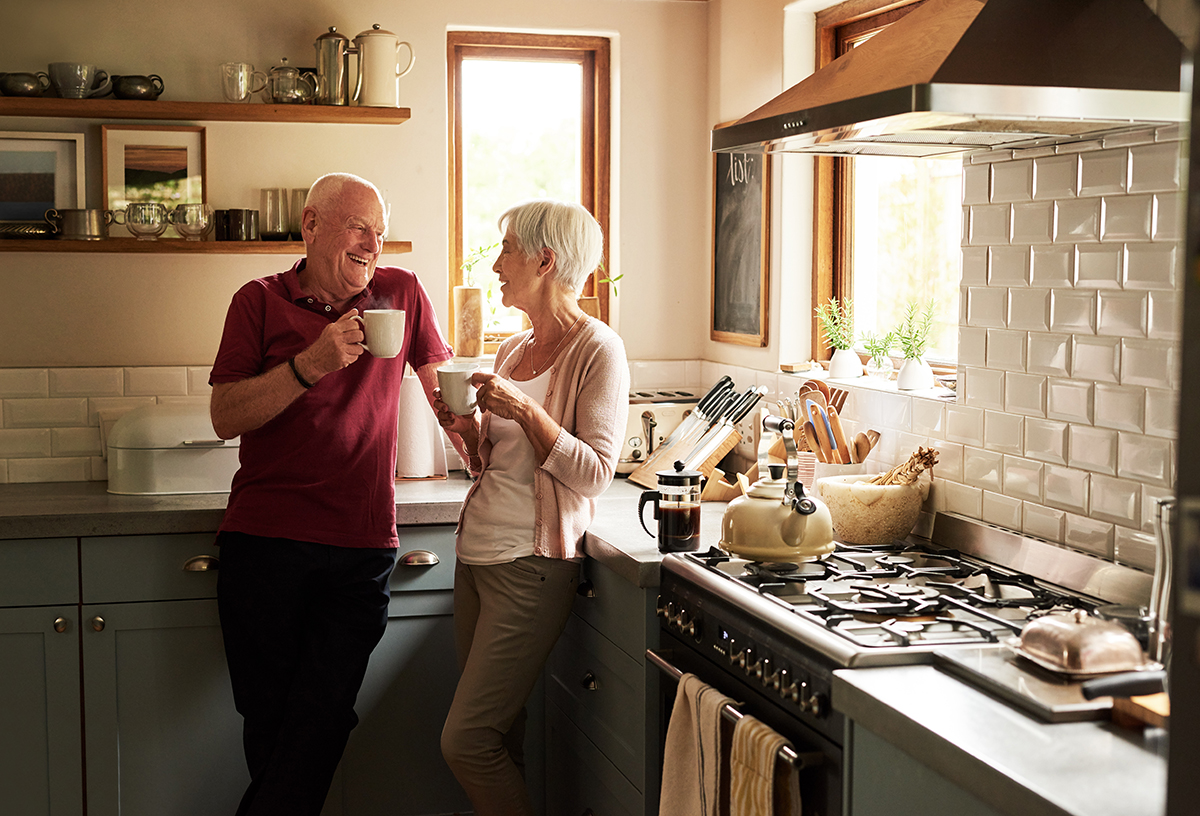Do you have a loved one diagnosed with dementia? When caring for someone with dementia at home, there are ways to create a safe and familiar home environment. Implementing appropriate and sensitive home safety measures can ensure that an individual living with Alzheimer’s Disease or related dementias can continue to remain in the familiar surroundings and comfort of his or her own home.
It is important to create a safe home environment that supports the person’s needs without feeling too restrictive. Additionally, the home should encourage independence and social interaction and provide clear areas for meaningful activities that align with the person’s interests and abilities.
Alzheimer’s Disease causes a number of changes in the brain and body that may affect safety. These recommendations from the Alzheimer’s Association take into consideration that people living with dementia may have altered judgment, forget how to use certain items, become easily confused, lose a sense of time or place, and have trouble with balance.
Home Safety Care
Avoid safety hazards in the kitchen.
Use appliances that have an automatic shut-off feature. Prevent unsafe stove usage by applying stove knob covers, removing knobs or turning off the gas when the stove is not in use. Disconnect the garbage disposal. Discard toxic plants and decorative fruits that may be mistaken for real food. Remove vitamins, prescription drugs, sugar substitutes and seasonings from the kitchen table and counters.
Watch the temperature of water and food.
It may be difficult for the person living with dementia to tell the difference between hot and cold. Consider installing an automatic thermometer for water temperature.
Assess bedroom safety.
Provide seating near the bed to help with dressing. Ensure closet shelves are at an accessible height so that items are easy to reach, which may prevent the person from climbing shelves or objects falling from overhead. Closely monitor the use of an electric blanket, heater or heating pad to prevent burns or other injuries.
Assess safety hazards in the garage and/or basement.
Limit access to large equipment such as lawn mowers, weed trimmers or snow blowers. Keep poisonous chemicals, such as gasoline or paint thinner, out of reach.
Place medications in a locked drawer or cabinet.
To help ensure that medications are taken safely, use a pill box organizer or keep a daily list and check off each medication as it is taken.
Improve laundry room safety.
Keep all cleaning products, such as liquid laundry pods and bleach, out of sight or secured to avoid possible ingestion of harmful chemicals. Consider installing safety locks on washing machines and dryers to prevent inappropriate items being put in or taken out too early.
Wandering Prevention
Understand why wandering occurs.
Wandering often occurs because a person with dementia becomes distracted while looking for someone or something, is looking to get away from an overwhelming situation or because of an old routine he or she once followed. Understanding the reason can be helpful in removing the trigger.
Install locks out of sight.
Place a latch or deadbolt either above or below eye-level on all doors to deter unlocking the door.
Label rooms in the house.
Label rooms with words or pictures that clearly display what the main purpose of the room is. Individuals living with Alzheimer’s Disease or other forms of dementia have been known to wander out of the house while searching for the kitchen.
Install remote monitoring systems.
An electronic door alarm, exterior cameras and indoor monitoring systems can alert loved ones when a person with dementia leaves the house or potentially falls.
Consider professional in-home care.
If your loved one has a history of wandering but you can’t be with him or her at all times. Bringing a professional caregiver into the home will give you peace of mind, knowing that someone is watching at times when you can’t.
Fall Prevention
Remove tripping hazards.
Remove throw rugs, extension cords and excessive clutter.
Keep walkways and rooms well-lit.
Changes in levels of light can be disorienting. Create an even level of lighting by adding extra lights in entries, outside landings, and areas between rooms, stairways and bathrooms. Use night lights in hallways, bedrooms and bathrooms.
Avoid injury in the bathroom.
Install grab bars for the shower, tub and toilet to provide additional support. Apply textured stickers to slippery surfaces to prevent falls. Consider installing a walk-in shower.
Keep stairways safe.
Provide handrails on BOTH sides of stairs. Install a light at the top and bottom of staircases and throughout hallways. Paint or place bright tape on the edge of steps to delineate where one step ends and another begins. Keep stairs clutter-free. Download the SYNERGY HomeCare Fall Prevention Guide to learn more ways to keep your loved one safe.
__________
For more on caring for a loved one with dementia, download SYNERGY HomeCare’s free Memory Care Guide.
SYNERGY HomeCare offers no obligation home assessments. Find a location near you or Contact us to talk to a Memory Care specialist.
Speak with a Memory Care specialist today
877-432-2692



